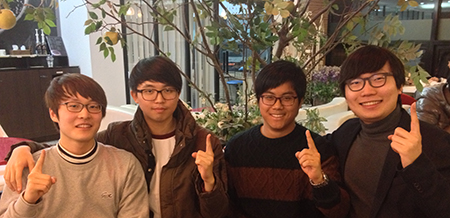Chalk is a student organization that creates online educational videos and provides them to the public for free. Following the successful launch of their non-profit online “Chalk Academy” in December last year, The KAIST Herald met with four members of Chalk to hear more about their work and the impact they hope to make.

Can you briefly introduce yourselves?
[Yeo] My name is Sooa Yeo, and I entered KAIST in 2007 and am now majoring in the Department of Physics. I am the founder of Chalk, and currently, I represent Chalk in social venture-related activities and manage its partnerships.
[Roh] I’m Donghyun Roh, a senior majoring in the Department of Mathematics, and I am the president of Chalk this semester.
[Park] I’m Sangjun Park, the vice president of Chalk and a sophomore majoring in the same department.
[Shin] I’m Jaesun Shin, a member of Chalk and I am a master’s degree student in also in the same department.
What motivated you to start Chalk?
[Yeo] I used to manage an offline education service organization that volunteered off campus. But transit was a huge barrier for people who wanted to volunteer, especially with the challenging courseload at KAIST. And the students we teach only get to see their teachers once a week. After thinking about possible solutions, we thought of an online education website like Megastudy or EBS. But their videos are filmed with expensive cameras at fancy studios. After brainstorming cheaper ways to make video lectures, we decided to use a tablet, which made a studio unneccessary since our faces wouldn’t be shown in the video.
When did you transition from offline to online?
[Yeo] Preparation for online services and the formation of Chalk started early 2012. We made videos, but our website wasn’t officially launched until December 2012. It opened much later than expected because we weren’t satisfied with the design, restructuring it about four times. The website (http://playchalk.com) didn’t receive much traffic at first, because people didn’t know about it. But on February 19, Chalk was featured in a news article, and on that day alone, we received 850,000 hits.
How many members did Chalk start with and are in it now?
[Noh] There were only four people when we first started. Since then, there have been almost 100 members who have come and gone. We have about 30 active members this semester.
[Yeo] We are an inter-university organization, so we also have members from Sookmyung Women’s University and Seoul National University. Yonsei University and Korea University are also in the process of forming partner clubs.
What differentiates Chalk from other educational service clubs?
[Yeo] After teaching offline for three years, I found myself simply repeating the same material. I thought, wouldn’t it be more meaningful to use this hour spent on teaching two or three students to create a video that could be watched an unlimited number of times? I’m not saying that we can replace volunteer groups that work offline. But I think those clubs could use our videos for more efficiency by helping students review repetitive information or by introducing new concepts. This way, they could use their extra time to give students meaningful advice tailored to individual needs. This is what high quality education is, and what students really want.
How are you able to manage Chalk financially?
[Yeo] We initially entered business contests to earn seed money, but soon learned that this was a short-term solution. We were trying to add a smart question-and-answer (Q&A) system to change our unidirectional website. But being a non-profit group, we couldn’t afford the server fee. After much consideration, we decided to sell the Q&A system to KAIST and use that money to invest in the website.
The smart Q&A system will be launched at KAIST in April, having already completed the beta test. We also made calculus videos, contributed by a “Calculus Team” consisting of skilled upperclassmen, to be used as supplementary materials for freshmen struggling with calculus.
Do you have a personal vision for the club?
[Shin] Korean education is structured so that the quality of education students receive is directly proportional to their family’s income. Universities are trying to address this issue by increasing the number of students they accept from low-income families, but the problem persisted after admission because those students continued to struggle in college compared to their wealthy peers. Through Chalk, I want to help those students and reduce inequality.
Do you have any last comments?
[Noh] I am aware that some people who find Chalk intimidating. If there is anyone hesitating to join, I would like to say, “I believe in your chalk.” Any volunteers are welcome, so please do not think twice about knocking on our door.
[Yeo] Chalk may have started at KAIST, but look at Facebook – it started in Harvard, but now we’re using it too. I hope Chalk too can spread to all universities in Korea, and even to professional organizations, and become a global phenomenon.
Also, massive open online courses (MOOCs) are really hot in the United States and over a hundred universities there are working together to run it. It’s like OpenCourseWare with an interactive component. Recently, a reporter from Fortune magazine contacted me and asked why MOOCs seems to be nonexistent in Korea when it’s all the rage in the States. The only Korean organization he found currently working on MOOCs was Chalk. That fueled our desire to be at the vanguard of introducing a new education culture in Korea.

